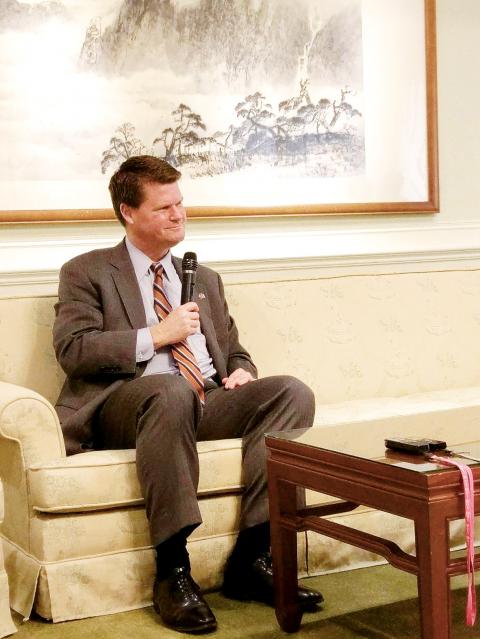The chance of US President Donald Trump and Chinese President Xi Jinping (習近平) signing a fourth US-China communique when they meet next month is very unlikely, a former US Department of State official said yesterday in Taipei.
“The information I have is that there is no plan for a fourth communique, so I don’t expect they will produce one in this meeting,” former US deputy assistant secretary of state for East Asian and Pacific Affairs Randall Schriver said.
Schriver, who now serves as president of the Project 2049 Institute, a US think tank focusing on security issues in Asia, said that while he expects that Trump and Xi would talk about the US’ “one China” policy during their meeting, the US president is likely to also underscore the importance of the Taiwan Relations Act (TRA) and the “six assurances.”

Photo: Lu Yi-hsuan, Taipei Times
He also expressed the hope that any conclusions of the Trump-Xi meeting would include “all the right things” about Taiwan and Washington’s important relationship with Taipei.
The three joint communiques — the Shanghai one of 1972, the one establishing diplomatic relations in 1978 and the one from 1982 — have provided the basic framework for Washington’s relations with Beijing since then-US president Richard Nixon’s historic visit to China in 1972.
The TRA came into force in 1979. Three years later, then-US president Ronald Reagan issued what were later known as the “six assurances” to ensure Taiwan that it would not be abandoned.
Turning to Taiwan’s national security, Schriver said having watched closely the Chinese People’s Liberation Army’s (PLA) modernization, he believes the US should assist in making weapons more available to Taiwan to address its security needs.
However, Schriver dismissed the possibility of the US also deploying to Taiwan a Terminal High-Altitude Area Defense system (THAAD), a system that recently arrived in South Korea, angering China.
Saying he was not aware of such a plan, Schriver said that Taiwan faces different threats in terms of ballistic and cruise missiles compared with South Korean and US forces in South Korea or Japan.
“I am not a technical expert, but I don’t know that THAAD would even be the appropriate system for Taiwan and Taiwan security needs,” Schriver said.
However, there is a need to think about strong missile defense and protection for Taiwan given the missile threats it faces, he said.
Presidential Office spokesman Sidney Lin (林鶴明) said the government will closely watch any developments regarding the Trump-Xi meeting, adding: “The US is Taiwan’s most important ally… As a member of the international community, we will continue to develop a stronger partnership with Washington in the hope of jointly contributing to regional peace, stability and welfare.”

Chinese Nationalist Party (KMT) Chairman Eric Chu (朱立倫), spokeswoman Yang Chih-yu (楊智伃) and Legislator Hsieh Lung-chieh (謝龍介) would be summoned by police for questioning for leading an illegal assembly on Thursday evening last week, Minister of the Interior Liu Shyh-fang (劉世芳) said today. The three KMT officials led an assembly outside the Taipei City Prosecutors’ Office, a restricted area where public assembly is not allowed, protesting the questioning of several KMT staff and searches of KMT headquarters and offices in a recall petition forgery case. Chu, Yang and Hsieh are all suspected of contravening the Assembly and Parade Act (集會遊行法) by holding

PRAISE: Japanese visitor Takashi Kubota said the Taiwanese temple architecture images showcased in the AI Art Gallery were the most impressive displays he saw Taiwan does not have an official pavilion at the World Expo in Osaka, Japan, because of its diplomatic predicament, but the government-backed Tech World pavilion is drawing interest with its unique recreations of works by Taiwanese artists. The pavilion features an artificial intelligence (AI)-based art gallery showcasing works of famous Taiwanese artists from the Japanese colonial period using innovative technologies. Among its main simulated displays are Eastern gouache paintings by Chen Chin (陳進), Lin Yu-shan (林玉山) and Kuo Hsueh-hu (郭雪湖), who were the three young Taiwanese painters selected for the East Asian Painting exhibition in 1927. Gouache is a water-based

Taiwan would welcome the return of Honduras as a diplomatic ally if its next president decides to make such a move, Minister of Foreign Affairs Lin Chia-lung (林佳龍) said yesterday. “Of course, we would welcome Honduras if they want to restore diplomatic ties with Taiwan after their elections,” Lin said at a meeting of the legislature’s Foreign Affairs and National Defense Committee, when asked to comment on statements made by two of the three Honduran presidential candidates during the presidential campaign in the Central American country. Taiwan is paying close attention to the region as a whole in the wake of a

OFF-TARGET: More than 30,000 participants were expected to take part in the Games next month, but only 6,550 foreign and 19,400 Taiwanese athletes have registered Taipei city councilors yesterday blasted the organizers of next month’s World Masters Games over sudden timetable and venue changes, which they said have caused thousands of participants to back out of the international sporting event, among other organizational issues. They also cited visa delays and political interference by China as reasons many foreign athletes are requesting refunds for the event, to be held from May 17 to 30. Jointly organized by the Taipei and New Taipei City governments, the games have been rocked by numerous controversies since preparations began in 2020. Taipei City Councilor Lin Yen-feng (林延鳳) said yesterday that new measures by